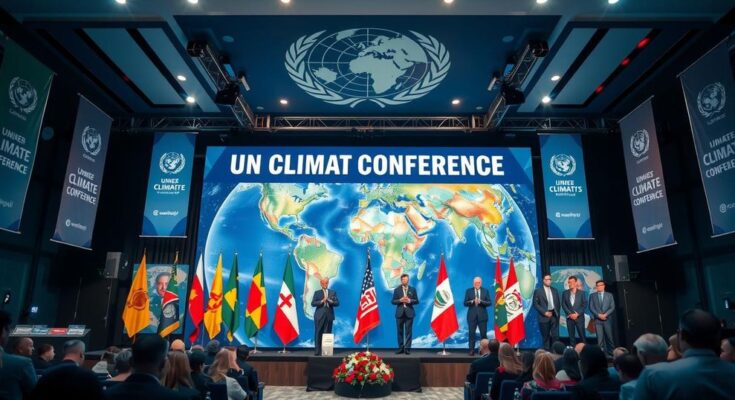The 29th UN Climate Conference (COP29) is underway in Baku, Azerbaijan, with delegates from nearly 200 countries discussing critical climate finance issues. A tense atmosphere surrounds the conference, accentuated by the absence of leaders from high-polluting nations. The focus is on establishing a new financial target to replace the outdated $100 billion goal while addressing the urgent needs of developing countries amid rising climate challenges.
The 29th UN Climate Conference (COP29) has commenced in Baku, Azerbaijan, where representatives from nearly 200 nations convene to discuss climate action under the auspices of the UN Framework Convention on Climate Change. Alden Meyer from E3G provides insights into the tense atmosphere at the summit, primarily revolving around the formulation of a significant finance goal to supersede the $100 billion annual pledge from developed nations. Meanwhile, notable absences of leaders from leading polluting countries have raised additional concerns. The mood at COP29 reflects the urgency characterized by a pressing climate crisis, compounded by the results of the recent U.S. elections, which have created uncertainty regarding the U.S. commitment to climate financing and partnerships. Alden Meyer mentions that while U.S. delegates, led by senior member John Podesta, strive to maintain negotiation momentum, apprehension remains regarding potential policy shifts under a second Trump administration, especially concerning the Paris Agreement and financial support for developing nations. In terms of global finance for climate resilience, there appears to be a stark divide between the trillions required for developing nations to transition to clean energy and the modest increases being proposed by developed countries. Developing countries are urging a more substantial financial commitment, underlining the inadequacy of current pledges relative to their actual needs in light of ongoing climate impacts such as flooding and drought. Meyer highlights the overwhelming need for a recalibration of global climate commitments, warning that current pathways are leading toward a 3-degree increase in global temperatures, suggesting catastrophic implications. As the conference progresses, the challenge lies not only in financial agreements but also in determining future commitments to stabilize emissions and restore global trust in multilateral climate actions. The importance of COP29 is underscored by its potential to influence future global cooperation and commitments to tackle the climate crisis, reinforcing that collective action remains critical in combating this existential threat to humanity.
The 29th Conference of the Parties (COP29) to the UN Framework Convention on Climate Change represents a critical annual meeting where member nations convene to negotiate commitments and strategies to tackle climate change. The conference occurs amidst escalating climate crises globally and marks a convergence of political, financial, and environmental discussions aimed at addressing urgent climate needs, particularly from developing nations who seek increased financial support for climate adaptation and mitigation. The backdrop of significant political changes, including leadership elections in key economies like the United States, adds layers of complexity to the negotiations.
COP29 serves as a pivotal forum for addressing crucial financial commitments and the political dynamics influencing climate action. The conference faces the daunting task of reconciling the vast financial needs of developing nations with the insufficient contributions currently being offered by developed counterparts. As decision-makers navigate these challenges, the outcomes could significantly shape the global response to climate change in the coming years, influencing the trajectory toward achieving the goals set by the Paris Agreement.
Original Source: www.loe.org




